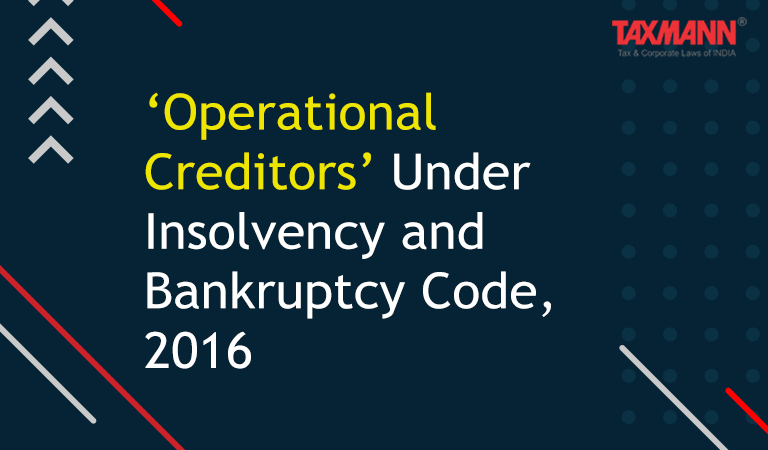‘Operational Creditors’ Under Insolvency and Bankruptcy Code, 2016
- Blog|News|Insolvency and Bankruptcy Code|
- 2 Min Read
- By Taxmann
- |
- Last Updated on 17 November, 2021

[2021] 132 taxmann.com 133 (Article)
Earlier, the creditors were generally classified only into two (2) categories as Secured and Unsecured Creditors. The Insolvency & Bankruptcy Code, 2016 (the Code) has made a distinction among creditors into five categories as Secured, Unsecured, Financial, Operational, and a Decree Holder. (Sec 3(10) of the Code). Therefore, the expressions “Financial Creditors” and “Operational Creditor” have been newly coined by the IBC, 2016. In similar legislation governing insolvency the world over, there is no such distinction as to Financial and Operational Creditors.
Financial Creditor:
As per Section 5(7) “financial creditor” means any person to whom a financial debt is owed. As per Section 5(8) of the Code, “financial debt” means a debt along with interest, if any, which is disbursed against the consideration for the time value of money.
Operational Creditor :
As per Section 5(20), “operational creditor” means a person to whom an operational debt is owed and includes any person to whom such debt has been legally assigned or transferred;
As per Section 5(21) of the code, “operational debt” means a claim in respect of the provision of goods or services including employment or a debt in respect of the payment of dues arising under any law for the time being in force and payable to the Central Government, any State Government or any local authority;
The ‘Operational Creditors’ can be classified into three different classes for determining the manner in which the amount is to be distributed to them:
(i) Those who have ‘supplied goods’ and ‘rendered services’ and thereby entitled to payment.
(ii) The employees who have ‘rendered services’ for which they are entitled to payment.
(iii) The Central Government, the State Government, or the Local Authority who has not rendered any services but dues payable under any statute like Goods and Service Tax Act and generally termed as statutory dues.
The dues payable towards “statutory dues” to the Government, Central or State or any local authority is also Operational debt, and the Government or the authority will be an Operational Creditor.
Click Here To Read The Full Article
Disclaimer: The content/information published on the website is only for general information of the user and shall not be construed as legal advice. While the Taxmann has exercised reasonable efforts to ensure the veracity of information/content published, Taxmann shall be under no liability in any manner whatsoever for incorrect information, if any.

Taxmann Publications has a dedicated in-house Research & Editorial Team. This team consists of a team of Chartered Accountants, Company Secretaries, and Lawyers. This team works under the guidance and supervision of editor-in-chief Mr Rakesh Bhargava.
The Research and Editorial Team is responsible for developing reliable and accurate content for the readers. The team follows the six-sigma approach to achieve the benchmark of zero error in its publications and research platforms. The team ensures that the following publication guidelines are thoroughly followed while developing the content:
- The statutory material is obtained only from the authorized and reliable sources
- All the latest developments in the judicial and legislative fields are covered
- Prepare the analytical write-ups on current, controversial, and important issues to help the readers to understand the concept and its implications
- Every content published by Taxmann is complete, accurate and lucid
- All evidence-based statements are supported with proper reference to Section, Circular No., Notification No. or citations
- The golden rules of grammar, style and consistency are thoroughly followed
- Font and size that’s easy to read and remain consistent across all imprint and digital publications are applied



 CA | CS | CMA
CA | CS | CMA

Great insights on the role of operational creditors under the IBC 2016. This blog clearly explains their rights and the resolution process with practical clarity.